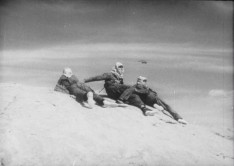So Much I Want To Say: A Glimpse Into Palestinian Erasure

The Game (1973)
Repeat screening!
Los Angeles Filmforum and Human Resources Los Angeles present
So Much I Want To Say: A Glimpse Into Palestinian Erasure
Screening + Performance Lecture
Monday, December 18, 2023, 7:30 pm
At Human Resources Los Angeles, 410 Cottage Home Street, Los Angeles CA 90012
https://www.h-r.la/
Full info: https://www.lafilmforum.org/
In person: curator Zaina Bseiso
Over Zoom: Bahaleen Collective
Tickets: RSVP Required. No guarantee of admission without RSVP. Make a donation to one of the groups below for free admission.
https://buytickets.at/losangelesfilmforum/1092427
Either reserve a free ticket and show proof of donation at the door, or buy a ticket for $15 and we will donate the proceeds to the organizations.
Palestine Children’s Relief Fund: https://pcrf1.app.neoncrm.com/forms/general
Medical Aid for Palestinians: https://www.map.org.uk/
Masks are highly recommended at Filmforum shows - N95 or KN95.
As we witness firsthand the abundance of power structures attempting to silence Palestinian voices, this screening and lecture/performance contextualizes the ongoing tactic of erasure. Hundreds of 16mm documentaries were made by the Palestine Film Unit and solidarity networks to portray the Palestinian struggle after the 1967 war. A large portion of those films were looted during the Israeli invasion of Beirut in 1982, making it virtually impossible to see and hear them. It is only through acts of solidarity and Palestinian resilience, exemplified by the Tokyo Reels, that we are able to access some of the films featured in this program, while many others remain locked in Israeli vaults, accessible only to vetted Israeli citizens.
This space of collective self-reflection will go beyond uplifting Palestinian voices. Borrowing its title from Mona Hatoum’s video art piece So Much I Want To Say, this program recounts a timeline of refusals by artists and collectives to remain silent, instead utilizing their tools to contribute to Palestinian narratives.
Guests:
Zaina Bseiso, Curator
Zaina Bseiso is a film director, producer, and curator working primarily in documentary and experimental cinema. Her work explores the relationship between the materialities of place and issues of memory, surveillance, corporeality, and nationalism. She received her master’s degree in film and video from the California Institute of the Arts. Bseiso is based in Los Angeles and was raised in Egypt by Palestinian parents. Her practice mainly traverses Egypt, Palestine, Cuba, Mexico, and the US. She is co-founder of Bahía Colectiva, a community of filmmakers that collaborate in practice and curation.
Bahaleen Collective
Today, we are Aya Bseiso, Khalid Odeh, and Noura Salem. We are a group of friends, sometimes colleagues, and often collaborators who are Palestinian artists, architects, surveyors, calligraphers, and researchers based in Jordan. Together, we are Bahaleen, a research group dedicated to exploring the emancipatory potentials of arts practice through a constellation of acts, projects, and productions. We aim to unearth and investigate the socio-political histories and colonized infrastructures of the region through a methodology and practice that offer new ways to experiment and activate research and knowledge production with a larger public.
For the past three years, Bahaleen has been engaged in several multi-year independent research projects that circle around notions of temporality, crossing borders, and impermanent-permanent infrastructures. Through a series of roaming artist residencies, we search for, name, and subvert narratives around water bodies, oil and gas pipelines, tourist projects, nature reserves, privatized property, and the commons through the practice of creating databases of projects, laws, and political agreements that have colonized, commercialized, privatized, and militarized our soil. All the while, looking at the performance of politics on sites of extractive economies. Our research methodologies are driven by an artistic process that utilizes participatory research frameworks, fieldwork, desk research, and documentation while experimenting with and pushing traditional research practices forward, with the aim of treating the research process as a generative space of production in and around art and academic institutions.
